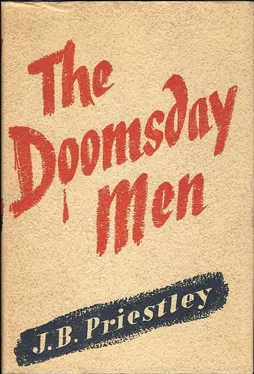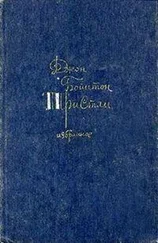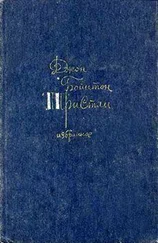“Have a piece of pie, Darbyshire?”
“Thanks, Hooker. But after you.”
“No, here you are.”
Mr. Larrigan had done only the barest justness to his wife’s capacity as a creator of pies. There might be something rather grim and formidable about Mrs. Larrigan; she might be too little aware of the easier feminine graces, too contemptuous of womanly charm; she might be disinclined at times-in Mr. Larrigan’s great phrase-to let things run natural; but she could make a pie.
“Hooker,” said Malcolm, rather sternly, “we must insist upon paying for this.”
“I doubt if they’ll take anything. These old Westerners have their own pride.”
“I know. And I appreciate it. But unless we agree that they must be paid, I don’t like taking another piece of pie.”
“We must pay them then, Darbyshire, because I’m going to have another piece.”
After a further interval, Malcolm said dreamily: “I don’t ever remember eating pie and drinking coffee at this time of day before, but there’s something to be said for it. I believe I could stay here a week or two, just sitting out there, staring at the mountains and dropping a philosophical remark now and then, and coming in three or four times a day for more coffee and pie. Not a bad life at all. Nothing to worry about. That’s what’s the matter with us, Hooker. Look at these people. They don’t care.”
“Not a hoot, I guess. They’ve enough to live on, and plenty of space, and peace and quietness,” said Hooker. “If I hadn’t some work to do, this would be the kind of life I’d like to lead. Think of all these business men worrying themselves sick and silly, into the grave-and all for what? Pa Larrigan here is better off than any of them.”
“Nice old boy, Pa Larrigan. I took to him at once.”
“Typical old-timer. I’ve met lots of ’em.”
“Didn’t tell us much about the MacMichaels, did he?”
“No. Wasn’t interested, I guess. And these Western folks, though they seem to say anything that comes into their heads, are inclined to be cautious really.”
“I was amused at the way in which they insisted upon knowing our names and a bit more about us, before they’d ask us in for coffee.” And Malcolm smiled.
Hooker did not look amused, but rather puzzled. “I didn’t quite get that,” he confessed. “That’s not the usual thing with these people. But living right out here, I guess-” He ended with a shrug.
The two young men lit cigarettes, and ruminated. It was very peaceful in there. The Golden Fleece itself was now piling up in the western sky. This was not the moment to begin planning again. Let things look after themselves for a little while: let them run just natural.
But Malcolm, looking out to enjoy the magnificent sky, found himself remarking: “The old couple seem to be very curious about your car, Hooker.”
This did not surprise Hooker, who knew that all good Americans have a deep and abiding passion for the automobile. Only the year before, one afternoon as he was going down Lexington Avenue during a brief visit to New York, he had noticed the unusual look of awed and reverent expectation on the faces of all the people approaching a large building and had then remembered it was the week of the Automobile Show. So he did not rise, but casually enquired what the Larrigans were doing.
“Poking round it,” replied Malcolm. “Pa’s inside now.”
Hooker chuckled. “There are one or two little gadgets of mine on that board that’ll give him something to think about.”
“He looks thoughtful,” Malcolm continued. “He’s getting out now. He’s coming back. So is Ma. She’s looking grimmer than ever. I hope she won’t mind about her pie. You’ve made it look pretty silly, y’know, Hooker.”
“ I have. Gosh!-you’d twice as much, Darbyshire. Not that I blame you. I tried pie and coffee over in England. You’re right to make the most of your chances.”
“Seems to me, Hooker,” said Malcolm, falling into the same vein, “you were too busy in England going on switchbacks and wearing false noses and picking up shop-girls, to know what sort of grub we have.”
Pa Larrigan stood in the open doorway, and surveyed them in his own easy candid fashion.
“Mr. Larrigan,” cried Malcolm, “the pie was marvellous. You must let us pay for what we’ve had. It’s not fair to come here and eat you out of your house-”
“Call it your supper,” said Mr. Larrigan briskly. “Now then, young fellers, step outside.”
There was such an odd change in his tone and in the look in his eye that first they stared at him and then at one another.
“Come on, step outside, before there’s trouble. And you can have trouble, if you want it.” And now he showed them, as he stepped back on to the porch, to allow them to come out, a very nasty-looking revolver that seemed to have seen much service.
They stared, wondering if this was some elaborate joke. But the genial, homely Western philosopher and humorist appeared to have vanished. There was a very hard and uncompromising look about Mr. Larrigan now. His tone was harsh. There was cold blue fire in his eyes-to say nothing of the revolver in his hand. They went out, still staring. Mrs. Larrigan appeared round the corner.
“Mrs. Larrigan,” cried Hooker, protesting, “what’s this?”
“This, young feller,” said Mrs. Larrigan grimly, deliberately mistaking his meaning, “is a shot-gun, and if you think I can’t use it, you don’t know me. Jest do what Paw tells yer, if you don’t want to get hurt.”
“Got another key to your car?” asked Mr. Larrigan sternly.
“No,” replied Hooker, not convinced yet that this wasn’t their idea of a joke.
“Well, I’ve got the one that was in the car, so don’t think you can get away. It’s a long walk to anywhere. And you can’t get that way.” He pointed towards the wire fence. “Don’t try it, young fellers. Did you open that door, Maw?”
“Shorely did, Paw.”
“Mr. Larrigan,” cried Malcolm earnestly. “I was just going to thank you both for being so kind and hospitable to a couple of strangers. But if you’re serious about this, let me tell you I think it’s a damned dirty trick.”
“And so do I,” said Hooker angrily. “I didn’t know Westerners asked strangers in to have a bite and a drink, and then did this to them.”
These reproaches had no effect upon Mrs. Larrigan, who told them to be quiet, but her husband looked a trifle shame-faced.
“My orders is to keep you here, boys, till I know what they want to do with you,” he said, with some trace of apology in his tone.
“But you can’t have had any orders,” said Malcolm, bewildered.
“The telephone,” said Hooker, out of the corner of his mouth. “After we told them who we were, she must have rung up the MacMichaels and told them. They gave the orders.”
“Now come on, Paw, we’re not going to stand here jest chattering.”
“Move on, boys,” Larrigan commanded. “We’re puttin’ you in that shack up there till you’re wanted.”
The two young men glanced at one another, then with a shrug walked slowly round the back, and, under the directions of Larrigan, who followed them, entered a small bare shack, which contained nothing but a couple of rough bunks, an old blanket or two, some sacking, a little tin stove and a little heap of wood.
“Here’s your place for the night, boys, or till you’re wanted,” said Larrigan at the door. “And it’s orders and can’t be helped. If you’re ready to take it easy-just letting her run natural-then that’s okay with me. But if you try any tricks, you’ll find we’re good an’ tough around here. So better make the best of it.”
“And how long are we supposed to stay here?” demanded Hooker.
Читать дальше









